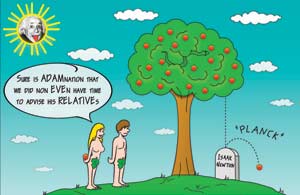GravyTee
A Philosophical Provocation

1998-2012
silver teapot with gilded silver tee, painted golf ball & newspaper clipping, 26x24x13 cm
We are not even sure that gravity actually exists:
Legend has it that Newton discovered gravity after an apple fell on his head while he was sitting under a tree reflecting on physics.
This story goes some way to demonstrating the gross over-simplification which science performs routinely. As when reading a criminal
detective novel, the reader of popular science is often in awe at the moment in which who or 'what' 'dunnit' is finally revealed. However, just as with Agatha Christie and PD James, Newton, Einstein, Hawking, et al., all work 'backwards', in a sense.
They know what happens – the apple falls, the ex-army major is poisoned – they only have to fill in the details which lead from A to B, then present them as facts. One marvels at how crime writers solve crimes that they themselves conceived of.
Without any grand universal measuring device (ie 'God'), it's really all a lot of postulation by beings so limited by – for example – gravity that they assume it to be some kind of universalizing force. Yet how can it be, if we don't know the wider co-ordinates of the surface or realm upon which these interactions between bodies are played out ? It's like an intelligent ape finding a spark plug and postulating that it must be fundamental to the running of something, not having even imagined that it might be part of a 'car'. If next he finds the driver's seat, he may postulate that he has found two of the components that make up a vibrating massage chair.
To be fair, with scientific investigation this process is a little different, but not as different as is commonly assumed. In the scientific community large amounts of people work on big phenomena – the beginning and end of the Universe are more significant subjects, objectively speaking, than the individual life and death stories recounted in novels and films – yet the consensus in the scientific community as to what is and is not true really serves to mask a fundamental inadequacy of science for serving its purpose; which is to provide completely objective fact.
The story of how Newton discovered gravity perfectly illustrates this point. For Newton having an apple fall on his head was evidence of a force which causes two given masses to come together, yet for the apple there can have been no such consideration.
As such, we have to assume gravity to be an interpretation of the human mind, however much it might correspond with an objective reality. The fact that - as if when writing a fictional account new characters might be added to account for arising discrepancies - both 'dark matter' and 'dark energy' (95% of "everything" despite the fact we don’t know if one or both exist at all !)
have been postulated to explain a missing amount of mass which gravity can't account for gives the lie to the supremacy of science. The arbitrary hypothesis of the existence of a divinity and, for totally different reasons, philosophy trump science, when it comes to ascertaining ... 'truth'. We proceed by a series of add-ons and patch-ups no matter what field we approach the fundamental questions from. ‘Dark matter’ and ‘dark energy’ are merely ingredients in a kind of seemingly endless consommé: We wish it were all gravy!

And as with all good English detectives, when reality becomes unfathomable, we may as well just put the kettle on !
“I say let the world go to hell, but I should always have my tea.”
Fyodor Dostoyevsky, Notes from Underground
Golf is playing with a small ball on the surface of a much larger one. The smaller ball does not "fall to the ground":
The surfaces of the two spheres simply return into contact.


